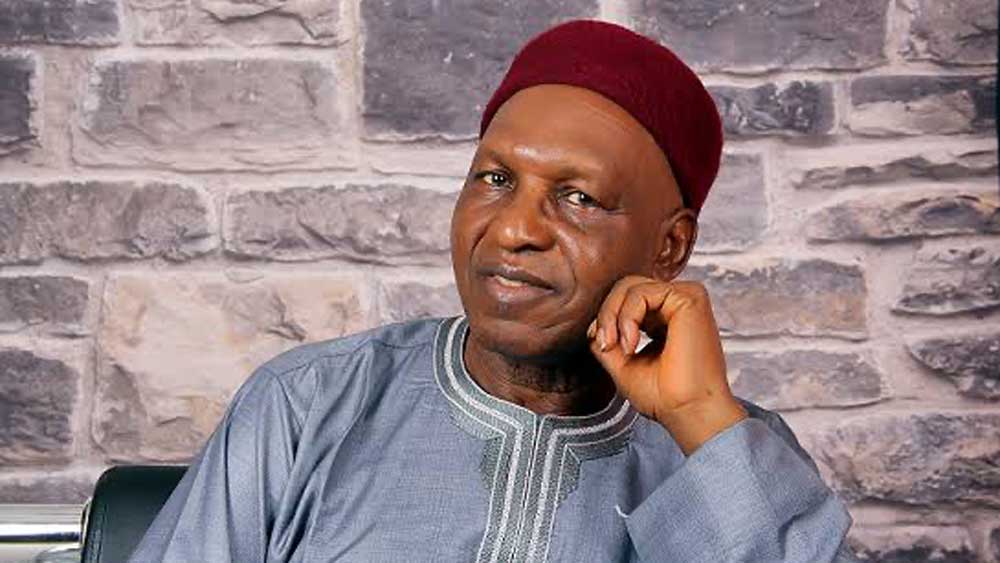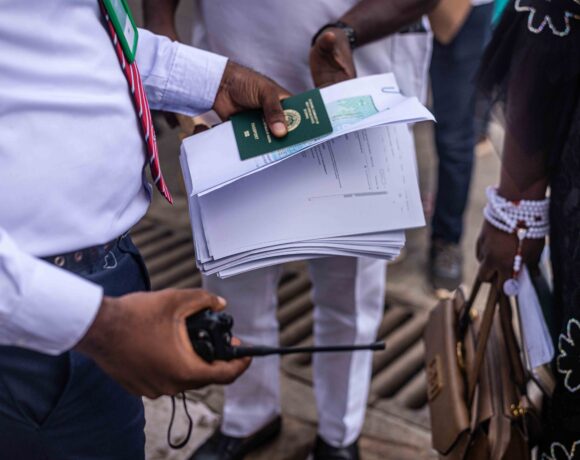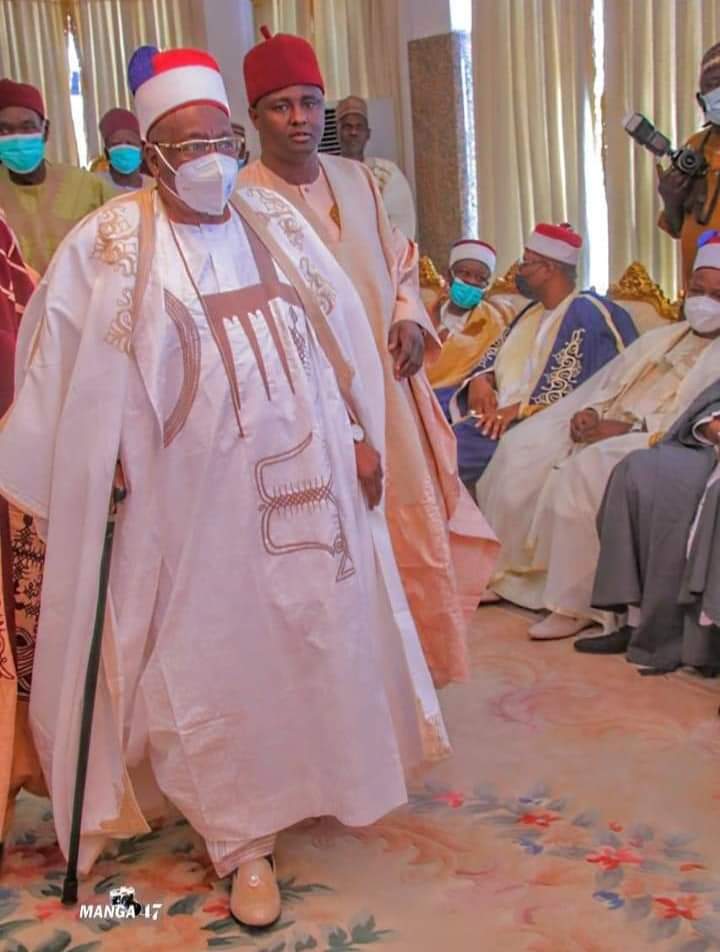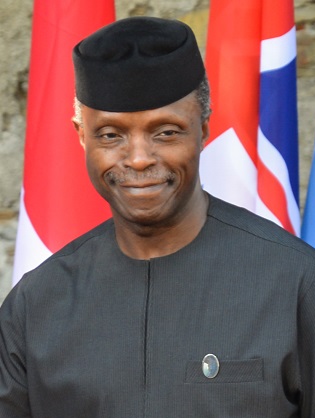Chief (Architect) Gabriel Yakubu Aduku (1944-2024): An icon departs with passion for humanity

By Theophilus Abbah
Not desperate, never agitated, not rebellious, not a mischief-maker, Chief (Architect) Gabriel Aduku exited this world of desperation, agitations, rebellion, and mischief on March 10, 2024, few weeks after his 80th birthday.
He was an unexplored treasure to humanity, a rare human resource and a man with a candle that shone in Nigeria’s pitch darkness. His calmness, his speeches, salted with grace, and carefully chosen diction could calm any storm. He had a still small voice even in turbulence.
Architect Aduku’s presence was a commanding power in every atmosphere where he was found. For decades, he was typically identifiable in his white flowing gown and red cap. The late Chief (Arc) Aduku would ‘never hurt a fly’. His demeanor was not the story of weakness, but more of focus. Obviously, these attributes facilitated his creative ingenuity in the execution of architectural and leadership projects, for which he was transcendental.
Architect Aduku’s presence was a commanding power in every atmosphere where he was found
Only recently, on January 25, 2024 at the Daily Trust Annual Dialogue, a day before he flew to the United States, never to return, as was characteristic of him, he demonstrated his uncommon passion for the North where he was born, educated, practised architecture, managed multiple business ventures and participated in politics for development.
It is on record that before he was elected as the Chairman of the elite Arewa Consultative Forum (ACF) in 2023, a body that conceived developmental agenda for the whole of northern Nigeria, the late Chief Aduku had conceived and enumerated an avalanche of projects that could elevate the North from being the country’s poverty capital to a prosperous, viable and enviable region in Nigeria and Africa. For him, the potential for the emancipation of the North was embedded in its natural endowments: waterways, mineral deposits, human resources, and pragmatic politics.
Over the brief period he served Nigeria as Minister of State for Health in 2007-2008, Chief Aduku set in motion the process of eradicating one of the major killers of the young and old in Nigeria – malaria. At that time malaria killed a record 300,000 babies annually, more than HIV did. In his drive to see it eradicated, Chief Aduku went to a renowned professor of Environmental and Insect Toxicology, Don Pedro Kio, who was lecturing and conducting researches at the University of Lagos, to understand the history and the strategies other countries adopted to tackle malaria from the colonial era up to that dispensation.
After the study, Chief Aduku came up with an approach that would have primarily ensured that insects were knocked off at larva stage through environmental management, as well as biological and chemical controls. Other strategies included indoor residual spraying (IRS) and insecticide treatment nets (ITN). The plans also included the deployment of satellite imagery to achieve photo-maps highlighting breeding sites.
The plan to eradicate insects that transmitted malaria from Nigeria was elaborate, but it could not be implemented as Chief Aduku’s tenure was truncated by controversial charges in a cesspool of corruption, for which he was later discharged and acquitted by both the Court of Appeal and Supreme Court on November 9, 2009.
Though his dream of eradicating malaria from Nigeria was aborted by political intrigues, Chief Aduku’s passion the for the development of the North and, indeed Nigeria, considering the low hanging opportunities in the region remained undaunted. In a press interview, Chief Aduku discussed the vision behind the creation of the North Central Peoples Forum (NCPF).
The late Chief Aduku was not comfortable about the half-hearted dredging of the River Niger and Benue, considering the economic benefits of the two rivers that spread across Nigeria. In the interview Chief Aduku said, “I have written to our colleagues, the Arewa Consultative Forum, to take it [dredging of Rivers Niger and Benue] up with President, Muhammadu Buhari. But from the records so far, especially since the beginning of Independence till now, every government has been saying that it would try to dredge the river. But over the years, the dredging has not seen the light of day. I have been on this issue since 2012. In 2018, I went to Arewa Consultative Forum (ACF) to raise it, but up till now, there is a lackadaisical attitude towards it. I personally would like to see Rivers Niger and Benue come upstream. All Nigerians must think about it because the fruits in it are enormous…”.
The late architect had said further that “The North Central Zone is full of development tools that can be used to harness the whole country together. Iron and steel is one big issue. But for the past 30 years, it has been abandoned. That was a project that would have landed the country in a full global iron and steel economy apart from other local market opportunities that it would have offered the people for economic prosperity. Since 1983 when it became moribund, it has not received any appreciable support to resuscitate it. The economic benefits of iron are so enormous and do not need much cry for it to be given attention…”
It was not only the moribund iron and steel company that was a source of concern to the late Aduku. He spoke about several others: “There are over 40 mineral resources under the soil. Kogi has a lot of them. Instead of leaving them to banditry exploitation, the right people must be engaged to maximize them for economic prosperity. In Niger State, you have the Kainji Dam… The Jeba Paper Mill could be resuscitated to maximize its economic potential. But we prefer to be importing papers from countries that are not blessed with rich vegetation like ours because papers come from wood. The newspaper industry spends staggering amounts of money on the importation of papers. If we can develop our paper mills, we, too, can become an exporter of papers and a source of supply to the newspaper industry and then, our economy can be better for it…”
Chief Aduku was never dormant politically. Active over the years, he left some remarkable footprints. He was not only a member of the defunct National Republican Convention (NRC) but served as the State Chairman in Benue and pioneer Chairman of NRC in Kogi State where his contributions led to the emergence of the late Prince Abubakar Audu as the Governor of the state under the flag of NRC. He was also a member of the defunct Democratic Party of Nigeria; and one of the founding members of the Peoples Democratic Party (PDP). To his credit, the late Chief Aduku designed the logo of the PDP as it is known today. He could be simply described as a silent political juggernaut. Apart from being involved in politics, he was an entrepreneur, having established several companies. He was an active participant in the Organized Private Sector (OPS) in Nigeria. He chaired the boards of several national companies. His roles in some of the entities included Senior Partner, Archcon Nigeria (Architects), 1972-84; Chairman, Nigeria Merchant Bank Limited, 1977-80; Chairman, United Nigeria Insurance Company Limited, 1980-83; Director, Beecham Limited, 1980; Executive Chairman, Archcon Nigeria (Architects); Chairman/Director, Kapital Insurance Limited; Chairman, Benro Packaging Company; Executive Chairman, ARCHCON Nigeria Limited; Chairman. AGY Nigeria Limited; Member of Council University of Maiduguri, 1976-80. The list is endless.
Chief Aduku was never dormant politically
Many young Nigerians may have heard about Chief Aduku being described as an architect, but they are unaware of the impact he had made in the sector. He was one of the earliest architects to emerge from Northern Nigeria and had served as Vice President and President of the Nigerian Institute of Architects. He would later become the Chairman of the board of the Nigerian Institute of Architects. He also served as Council Member, International Union of Architects (1993 – 1999).
Some of the outstanding architectural projects his company Archcon Nigeria executed include the followings: 500-bed General Hospital at Gbagada, Lagos; master planning and design of faculty buildings at the University of Sokoto; Bauchi State Government Secretariat; multi-storey building at Northern Nigerian Investment Limited, Kaduna; residence of the Nigerian ambassador in Germany, Bonn; and private residence of the late President Shehu Shagari.
Others are the premises of Savannah Bank, Kaduna; United Bank for Africa, Zaria and Makurdi branches; 60-staff standard design for Union Bank of Nigeria; First Bank of Nigeria, Bauchi; Bank of Commerce and Industry; Kaduna International Trade Fair Complex; military buildings, Military Cantonment, Jaji, Kaduna; second aircraft hangar, classrooms and jet simulator complex for the Nigerian Civil Aviation Training Centre, Zaria; office complex of NICON Insurance Plc, Abuja; Benue State Government Secretariat, Makurdi, new Lokoja General Hospital; Maitama District Hospital, Abuja, and Karu General Hospital, Abuja. He was indeed an enviable icon in the architectural profession.
The late Chief Aduku hailed from Anyigba in Dekina Local Government Area of Kogi State. He was born into the family of the late Pa Aduku Agwuye Aga and Mrs Ajetu Aduku on February 3, 1944. He was the Amana Ogochi I of Igalaland, a title bestowed upon him by Atta Igala. He attended Qua Iboe Mission School, Idah; Okene Secondary School, Okene; and the Ahmadu Bello University, Zaria, where he obtained both B.Sc and M.Sc Architecture in the 1970s.
He devoted the later part of his life to the service of God and humanity. He led several campaigns against political violence, armed thuggery and other vices in Igalaland. He was Chairman of Kogi East Elders Council, a post he held till his passage to glory. A very notable role he played for the Igalaland was his challenge of the 2006 population census in which the Igala were shortchanged in their majority population position in the state and Nigeria at large. He stood for and spoke the Igala voice up to the Appeal and Supreme Courts, until the case was thrown out. However, this did not go down well with a section of Kogi State.
The late Chief Aduku was happily married to Lydia Iye Aduku and, as stated in the Bible, “Blessed is the man whose quiver is filled with children”. The union is happily blessed with six children. He was a loving husband, a caring and darling father and a philanthropist who put smiles on the faces of orphans and widows. He saw many indigent students through school via admissions and payment of tuition fees, both at home, abroad and across religions. The late colossus equally contributed immensely to the growth of the church having served as an Elder in the United Evangelical Church till his exit from this world. It is on record, too, that he sponsored many Muslims on Hajj. He was widely travelled, having visited many countries of the globe. He loved playing golf and reading, especially at his spare time.
Though the Igala nation and Nigerians who interacted with Chief Aduku are mourning his death, it is apparent that he made social, political and economic imprints that will remain indelible for decades after his exit.
May his soul rest in peace.
Theophilus Abbah lives in Abuja
The Insight Report
Nigeria Coverage



